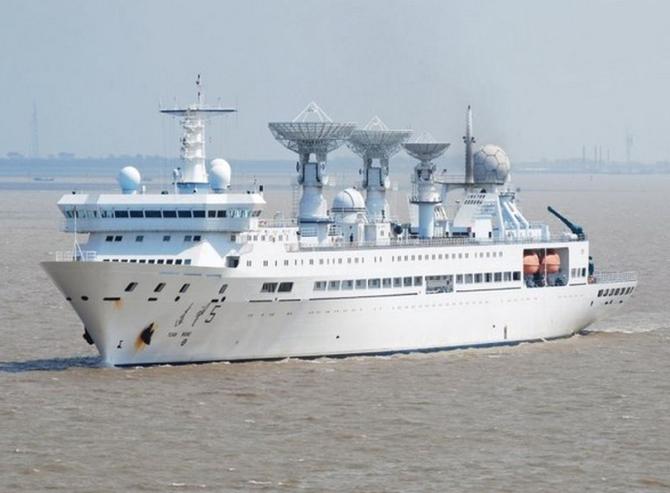If you are serious about countering the Chinese threat, then the best weapon is investing in real freedom, plurality, elections and democracy.
Unfortunately, it isn't an approach all Indians currently seem to agree on, notes Shyam G Menon.

In a column dated August 7, 2022, the Sri Lankan publication, The Sunday Times, said on the Chinese research ship expected to dock at Hambantota port: 'For India, Lanka is an inescapable geographical presence, an island that can be transformed into a veritable enemy aircraft carrier anchored on her doorstep, within strike range. It is in her national interest to ensure that Lanka does not fall into the wrong hands. Especially that of China, her long-time implacable foe.
'For China, the island is the coveted pearl in the Indian sea, the strategic rear door to India, a tropical destination in her ancient Silk Route, now revived as One Belt, One Road to increase her sphere of influence in Asia, Africa and Europe. Important as Lanka is to her strategic interests, the inclusion is based on a broader perspective, on a more global vision.'
To grasp the imagery evoked above, we must rewind to the controversial visit of Nancy Pelosi, speaker of the United States House of Representatives, to Taiwan on August 2.
Shortly after she left Taiwan, the island had to face a massive military exercise unleashed by China, which rendered the Taiwan Straits and waters around Taiwan unsafe for commercial shipping.
There were fears that what China was communicating via its muscle flexing was its capacity to invade Taiwan.
News reports of that period (and indeed earlier ones too) had used the metaphor of Taiwan and its friendship with the US resembling an aircraft carrier off China's shores.
China and Taiwan are geographically close to each other. Given Sri Lanka's still closer geographical proximity to India, the Chinese ship-incident is a moment, wherein the same metaphor works although media reports pushing the imagery overlook India-Sri Lanka ties and Sri Lanka (unlike Taiwan) being an undisputed sovereign nation.
On August 8, the Sri Lankan newspaper The Island reported that the Pakistani naval ship, PNS Taimur, was at Colombo port for a joint exercise with the Sri Lankan navy in the western seas.
Pakistan and China are known to be diplomatically close. News reports said, the Pakistani naval ship was built in China.
The above visits by Chinese and Pakistani ships coincided with the grand manner in which, India was marking its 75th year of Independence.
Like the Americans who became superpowers much before them, the Chinese have shown the appetite for moving pieces on the chess board with a view to pitch strategy against strategy and gauge the response of adversaries.
For India, located in China's neighbourhood, this has meant a diet of irritations, the most emblematic of it being the periodic border tensions in the Himalaya.
In a world armed with nuclear weapons the most common military game in town is the one around provocation and strategy.
Following in the footsteps of the Cold War, it has become the habit of every superpower and aspiring superpower to needle their foes for potential cracks in defence.
China is now officially a superpower. It has inherited the traits of the US and the erstwhile Soviet Union.
It will try its best to gift India, an aspirant to superpower status, the equivalent of what a Cold war era-Cuba or Central America was to the US.
Or what the US did with NATO (the North Atlantic Treaty Organization) to the Soviet Union.
And for that matter, not any different from what the world does with Taiwan in China's neighbourhood; China does with North Korea to South Korea, Japan and the US or what the US did for years with Pakistan to India.
Mankind's appetite for mischief is tremendous and if you travelled the world (in your mind) tracing such mischief, it will be an unending journey.
Needless to say, the above said business also performs a self-fulfilling role for the world's security and diplomatic establishments. It is what they do. In turn, it keeps them relevant.
As of mid-2022, our COVID-pummelled-world is too fragile to risk conflict.
Global commerce is currently heavily skewed in favour of China.
Countries won't be able to redraw supply lines at short notice; certainly not without inviting additional costs.
Many countries are tackling inflation. The Russia-Ukraine war added fuel to the problem.
Status quo restored in the Taiwan Straits is the best option under the circumstances.
That is what India recommended. Closer to home, we must realise in the context of the ship's visit that there is only so much India can object to as regards Sri Lanka deciding to host a Chinese research vessel.
The Kolkata-based Telegraph newspaper pointed out in an article dated August 14, 2022, 'China's greatest threat is that it could veto or stall the IMF loan that Sri Lanka desperately needs.'
Besides, if reminding India that it has a Taiwan in its neighbourhood is what China wished to achieve with the ship's visit, then letting Sri Lanka decide independently is the best medicine India can administer.
Our neighbourhood policy does not have to be based on the Chinese template.

However, there is both a convenient blind-eye and a risk in the Indian response to China's game of chess.
Let's start with the convenient blind-eye. While on the face of it, the Indian response to the China-Taiwan equation may appear dissimilar to the Chinese template, it may not actually be so.
China's problem with Taiwan is quite similar to India's with Pakistan occupied Kashmir.
For years now, India has been seeking restoration of its physical jurisdiction over PoK.
Following the 1962 War, China occupied Aksai Chin. So, there is nothing surprising in India's response to the recent spike in China-Taiwan frictions being a reiteration of the One China-policy and appeal for status quo.
It is without doubt the wise and practical option to follow in our post-COVID world craving peace and stability. It also ensures that we don't dilute our position on issues elsewhere that are important to us.
One China cannot be greater than similar wish nursed by other countries.
The risk from every poke by the Chinese relates to a very domestic concern.
The political Right-wing that currently rules India keeps displaying a trajectory that is similar to that of the Communist party in China.
India's Right-wing has never hidden its appetite for dominance.
Consequently, the more China whips up insecurity for India, the greater the tendency in India to respond to those threats in the same pattern China does -- by swearing loyalty to the dominant party.
We end up a mirror image of China differing only in terms of ideology.
For the Middle Kingdom, wanting engagement with the world for trade and commerce and not wishing political change back home by it, dealing with mirror images and the like-minded, would be dream come true.
That is why if you are serious about countering the Chinese threat, then the best weapon is investing in real freedom (with full respect for human rights), plurality, elections and democracy.
Unfortunately, it isn't an approach all Indians currently seem to agree on.
More than anything else, that Chinese ship in Hambantota reminds of a massive navy behind it, in turn harking of a massive military, massive economy and GDP behind it.
All that made possible by China's choice of politics.
So, if China's GDP and superpower-swagger is what we wish for, then can we say no to the politics behind it?
Hopefully, that ship doesn't have the last laugh.
Shyam G Menon is a Mumbai-based columnist.
Feature Presentation: Aslam Hunani/Rediff.com










